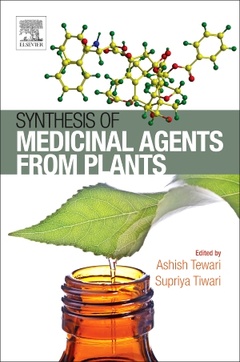Synthesis of Medicinal Agents from Plants
Coordonnateurs : Tewari Ashish, Tiwari Supriya

Synthesis of Medicinal Agents from Plants highlights the importance of synthesizing medicinal agents from plants and outlines methods for performing it effectively. Beginning with an introduction to the significance of medicinal plants, the book goes on to provide a historical overview of drug synthesis before exploring how this can be used to successfully replicate and adapt the active agents from natural sources. Chapters then explore the medicinal properties of a number of important plants, before concluding with a discussion of the future of drugs from medicinal plants. Illustrated with real-world examples, it is a practical resource for researchers in this field.
In an age of rapid environmental destruction, hundreds of medicinal plants are at risk of extinction from overexploitation and deforestation, limiting the natural resources available for active agent extraction, thereby threatening the discovery of future cures for diseases. Simultaneously, with the increasing population and advances in medical sciences, the demand for drugs is continuously increasing and cannot be met with just plants. The ability to synthetically replicate the active compounds from these plants is essential in creating an ecologically-aware, sustainable future for drug design
1. Significance of medicinal plants in human life 2. Drug synthesis from natural products: A historical overview and future perspective 3. Substituting medicinal plants through drug synthesis 4. Bioactive Constituents of Neem 5. Turmeric: Isolation and synthesis of important biological molecules 6. Properties and important molecules of medicinal interest in wood apple (Aegle marmelos) 7. Medicinally important constituents of Tulsi (Ocimum spp.) 8. Biological importance of Aloe vera and its active constituents 9. Alkaloid group of Cinchona officinalis: Structural, synthetic and medicinal aspects 10. Isolation of medicinally important constituents from rare and exotic medicinal plants 11. Medicinal properties of marine plants 12. Ayurveda: A new dimension in the era of modern medicine 13. Dual role of drugs: Beneficial and harmful aspects 14. Introduction to medicinally important constituents from Chinese medicinal plants
Chemists, medicinal chemists, biochemists, pharmacologists, botanists, R&D professionals, students, university libraries, researchers
Dr Tewari’s major field of research is Molecular Recognition and Medicinal Chemistry, with emphasis on the synthesis of bio active molecules, flexible molecules with aromatic back bones and synthesis of foldamers in order to study aromatic interactions. His research group’s aim is to understand the mechanism of aromatic interactions, and they are actively working in the synthesis of pyrazole, imidazole, pyridone, and pyridazine systems, where they have produced some particularly interesting results relating to solid state eclipsed and staggered stacked conformations.
Dr Tiwari’s groundbreaking research is focused on the antioxidant response of plants growing under the stress of ground level ozone, and involves evaluating the function and adaptation of plants antioxidant machinery to cope with this stress. As well as producing over 20 publications (include 2 book chapters) which have appeared in various well reputed National and International journals, Dr Tiwari’s research findings have gained recognition through National and International Awards, including the Young Scientist Medal of the Indian National Science Academy (INSA) and the esteemed Green Talent Award, from the Ministry of Education and Research, Germany.
- Includes detailed coverage of therapeutic compound synthesis
- Uses multiple real-world examples to support content
- Lays out a sustainable template for the future of developing active agents from natural products
Date de parution : 04-2018
Ouvrage de 368 p.
15x22.8 cm
Thème de Synthesis of Medicinal Agents from Plants :
Mots-clés :
<; P>; Medicinal Plants; Synthesis; Bioactive agents; Assays; Compound Isolation; Natural; Drug; Green Chemistry<; /P>


